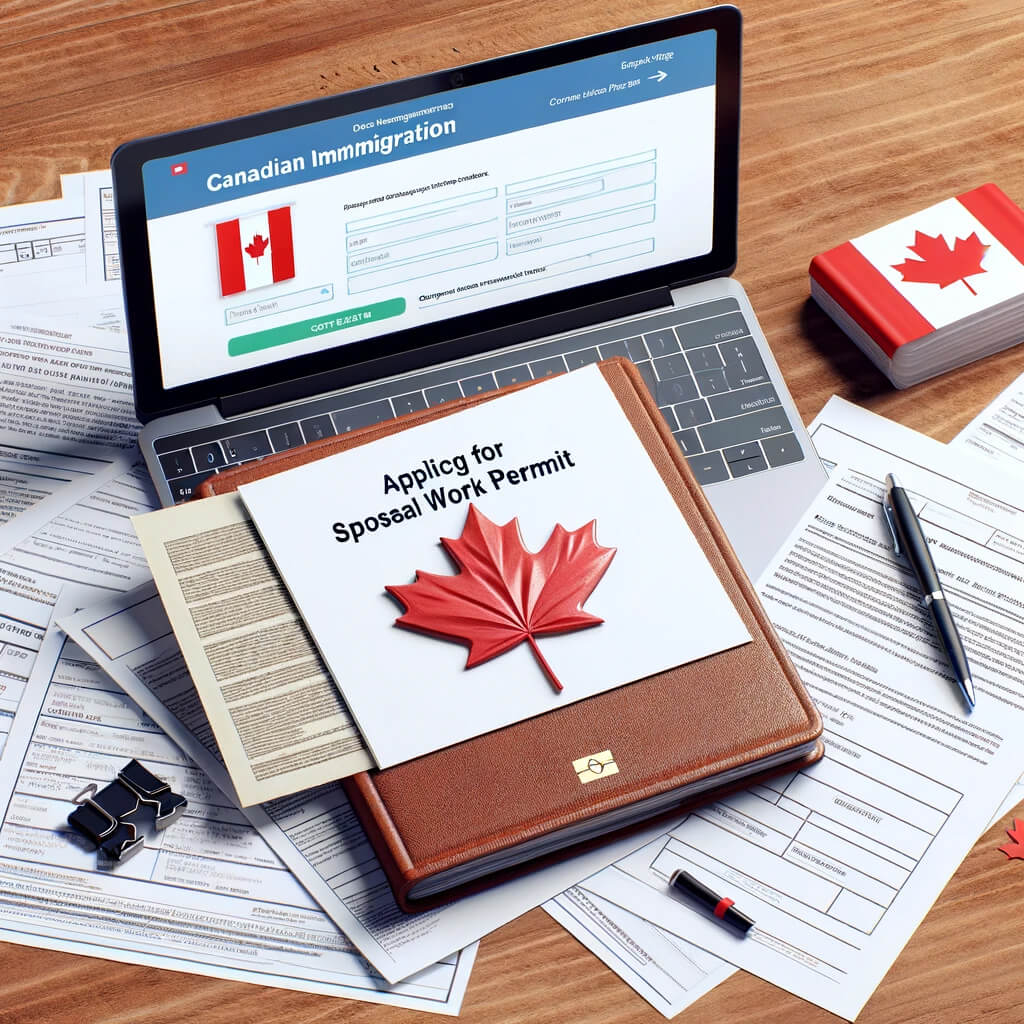Work Permit for Spouse Canada: A Comprehensive Overview
Your Quick 30-Second Answer to Work Permit for Spouse Canada!
The Spousal Open Work Permit in Canada allows spouses and common-law partners of Canadian citizens or permanent residents to work for any employer without a specific job offer. To be eligible, applicants must have submitted a permanent residence application and have valid temporary resident status. The application process involves waiting for an acknowledgement of receipt letter from Immigration, Refugees and Citizenship Canada (IRCC), then applying online with a personalized document checklist and paying the application fee. This permit helps ease the economic and emotional burden during the immigration process, enabling spouses to contribute economically while awaiting permanent residency decisions.
For an in-depth overview, please see the "Table of Contents" below.
Eligibility and Application Process - Work Permit for Spouse Canada
Welcome to our comprehensive guide on obtaining a Work Permit for Spouse Canada. This guide is designed to help you understand the process and requirements for spouses who wish to work in Canada. Whether you are a spouse of a permanent resident, a Canadian citizen, an international student, or a full-time student in Canada, this guide will provide valuable insights into securing a work permit for your spouse.
TABLE OF CONTENT
Overview Spousal Work Permits
1. Introduction: Work Permit
2. PR and Citizenship
Eligibility and Application
3. Eligibility for Work Permit
4. Application Process
5. Required Docs and Criteria
Specific Permit Categories
6. Work and Study Permit
7. Special Considerations
Procedural and Legal Aspects
8. Procedures and Legal Services
Further Information
9. Frequent Questions (FAQs)
10. Additional Resources

1. Introduction - Open Spousal Work Permit in Canada
Securing a work permit for your spouse in Canada requires careful planning and adherence to the application process. Understanding the eligibility requirements, preparing the necessary documents, and meeting financial obligations are key steps. Whether you are applying for the first time or seeking to renew an existing permit, having the right information and professional support can make the process smoother.
the Spousal Open Work Permit in Canada allows spouses and common-law partners of Canadian citizens, permanent residents, or temporary residents (with a work or study permit) to work in Canada. The permit enables them to work for any employer without needing a specific job offer.
Eligibility Criteria:
- 1. Permanent Residence Application: The couple must have submitted a permanent residence application through the inland sponsorship stream of the Spousal/Common-Law Partner Sponsorship Immigration Program.
- 2. Temporary Resident Status: The foreign national work permit applicant must have valid temporary resident status as a visitor, student, or worker in Canada.
Application Process:
- 1. Wait for Acknowledgement of Receipt Letter: From Immigration, Refugees and Citizenship Canada (IRCC) regarding the sponsorship application.
- 2. Apply Online: Once the receipt letter is received, apply for a spousal open work permit online.
- 3. Document Checklist: A personalized document checklist will be provided, which includes filling out the online application form and uploading necessary documents, such as proof of relationship and the principal applicant’s work or study permit.
- 4. Application Fee: Pay the application fee online.
Additional Considerations:
- Some spouses may enter Canada as visitors before applying for a work permit.
- In certain cases, work permit applications for spouses are processed simultaneously with student/work permits at Canadian visa offices abroad.
This spousal open work permit is an important tool for supporting families during the immigration process, allowing spouses to contribute economically while awaiting permanent residency decisions. It is part of Canada's efforts to ease the economic and emotional burden of the immigration process.
2. Permanent Residence and Citizenship Canada
Transitioning to Permanent Residency
- Permanent Residence: Spouses with a valid work permit in Canada may eventually qualify for permanent residence. This process involves meeting certain criteria set by Citizenship Canada.
- Sponsorship Application: For spouses seeking permanent residence, a sponsorship application by a Canadian citizen or a permanent resident (the potential sponsor) is a common pathway.
Understanding the nuances of the visitor record and the importance of the NOC skill type in your permanent residency application is crucial. These elements play a significant role in determining the success of your application, especially when transitioning from a temporary to a permanent status in Canada.
Navigating the process of securing a work permit for your spouse in Canada, including the complexities of a new open work permit or renewing an existing one, requires a thorough understanding of each step – from eligibility to application submission. Whether you are a holder of an open work permit, or applying under common law or Canadian spousal sponsorship, each pathway has its unique requirements and benefits.
Remember, the journey to obtaining a work permit or pursuing Canadian spousal sponsorship is unique to each individual and family. Seeking the assistance of a skilled Canada immigration lawyer or a regulated Canadian immigration consultant can provide you with tailored advice, ensuring your application aligns with the latest requirements and increases your chances of success. Their expertise can guide you through the complexities of the Canadian immigration system, making your journey smoother and more assured.
Canadian Immigration Law and Consultation
- Navigating through Canadian immigration law can be complex. Working with a regulated Canadian immigration consultant or a Canadian immigration lawyer can ensure proper adherence to all legal services and application procedures.
- Canadian immigration lawyers and consultants understand the latest immigration streams and policies set by the Canadian government and can provide expert guidance.
3. Eligibility for Spousal Work Permit
Who Can Apply
To apply for a Work Permit for Spouse Canada, certain eligibility criteria must be met. If your spouse is a permanent resident or a Canadian citizen, you can apply for an open work permit. For spouses of international students or full-time students holding a valid study permit, there are specific conditions that must be satisfied.
Conditions for Eligibility
- Spouses of permanent residents or Canadian citizens must demonstrate a genuine relationship, evidenced by a marriage certificate or proof of a common-law relationship.
- For spouses of international students, the student must be enrolled full-time at a Canadian private school, college, university, or other accredited educational institution.
- The principal foreign worker or student must have a valid work or study permit.
4. Application Process

Steps to Apply
The application process for a work permit for spouse Canada involves several steps, each crucial for a successful outcome.
- 1. Gather Required Documents: This includes a marriage certificate, travel document, and proof of your spouse’s current employment or study in Canada.
- 2. Complete the Application Form: Ensure all information is accurate and complete.
- 3. Submit the Application: This can be done online or at Canadian visa offices.
Processing Time and Fees
- The processing time for spousal work permits varies and can be checked on the Immigration Canada website for the most up-to-date information.
- Applicants must pay the processing fee and, if applicable, the open work permit holder fee.
5. Required Documents and Additional Criteria
Essential Documentation
You will need to provide several documents as part of your application, including:
- Marriage certificate or proof of common-law relationship.
- The principal applicant’s valid work or study permit.
- Proof of financial support and basic needs for the duration of the permit.
Additional Requirements
- A medical examination may be required, especially for certain jobs or if you have lived in certain countries for consecutive days.
- You must also prove that your relationship with the principal applicant is genuine and not solely for immigration purposes.
6. Open Work Permit and Study Permit Holders

Rights and Restrictions
- Open work permit holders are allowed to work for any employer in Canada without the need for a specific job offer.
- However, there are certain restrictions, such as working for employers who comply with all labour laws and do not engage in illegal businesses.
Study Permits and Post-Graduation Work
Impact on Spousal Work Permits
- If your spouse is a graduate student or an international student in Canada, their study permit significantly impacts your Work Permit for Spouse Canada.
- Spouses of students enrolled in eligible Canadian institutions can apply for an open work permit, allowing them to gain valuable work experience in Canada.
Post-Graduation Work Permit Program
- The Post-Graduation Work Permit Program (PGWP) offers graduates from eligible Canadian institutions the opportunity to obtain an open work permit and work in Canada.
- If your spouse is a holder of a post-graduation work permit, you may also be eligible to apply for an open work permit, depending on your spouse’s work permit conditions.
Work Permit Types and Requirements
Understanding Different Work Permit Categories
- Spousal Open Work Permit Application and Type of Permit: There are different types of work permits, including spousal open work permits, which allow the holder to work for any employer in Canada.
- Foreign National and Valid Work Permit: As a foreign national, it’s crucial to ensure you have a valid work permit, adhering to the expiration date and the conditions set by the Canadian government.
7. Special Considerations
LMIA and Job Offers
- In some cases, a labour market impact assessment (LMIA) may be required, especially if the work permit is tied to a specific employer.
- Having a valid job offer from a Canadian employer can be beneficial, but it's not mandatory for an open work permit.
Common-Law Partners and Dependent Children
- Common-law partners of skilled workers or students in Canada can also apply for a work permit.
- Dependent children who want to work in Canada may need to apply for their own work permit.
8. Governmental Procedures and Legal Services

Application Procedure and Legal Representation
- The application procedure for a spousal work permit involves various steps and strict adherence to the Canadian government’s guidelines.
- Having legal representation or consultation can simplify the process, especially if the case involves complex issues like appeals or legal status concerns.
Fees and Financial Considerations
Processing Fees and Additional Charges
- There are required fees associated with the work permit application process, including a processing fee and, in some cases, an open work permit holder fee.
- Additional fees might apply for services like medical examinations or the translation of documents.
Financial Support and Proof of Funds
- Applicants must provide evidence of financial support to ensure that they can meet their basic needs and those of their family members during their stay in Canada when they apply for work permit for spouse Canada.
- Proof of funds can be shown through bank statements, employment letters, or other financial documents.
Visas and Legal Status
Visa Applications and Legal Compliance
- Temporary Resident Visa and Visitor Visa: Those looking to join their spouse in Canada may first enter as visitors, requiring a temporary resident visa or a visitor visa.
- Study Permit Applications and Foreign Students: For foreign students, their spouse’s study permit can influence the type of work permit they are eligible for.
Special Categories and Considerations
Unique Situations in Work Permit for Spouse Canada
- Conjugal Partner and Common-Law Partner of a Student: Special considerations are given to conjugal partners and common-law partners, including those of students, in work permit applications.
- Dependent Spouse and Family Member: The dependent spouse or other family members may have specific eligibility criteria based on the principal’s current employment or the sponsored person's status.
Employment and Skills Assessment
Job Offers and Skill Level Requirements
- Offer of Employment and Skill Level: Some work permits, especially those linked to specific job offers, may require assessment of the skill level based on the National Occupational Classification (NOC).
- Skilled Occupation and Canadian Work Experience: Gaining Canadian work experience in a skilled occupation can enhance eligibility for certain immigration streams.
Application Process and Documentation
Completing the Application with Required Information
- Supporting Documents and Client ID: Applicants must provide supporting documents, including a marriage license for spouses, and ensure their Client ID is included in all communications with IRCC.
- IRCC Account and Application Procedure: Applications are typically processed through an IRCC account, where applicants can track their application status and comply with the following requirements.
Additional Considerations
New Measures and Immigration Updates
- New Measure and Immigration Officers: Stay informed about any new measure introduced by the Government of Canada that could impact work permit for spouse Canada applications.
- Foreign Workers and Length of Time: Foreign workers should be aware of the length of time and period of time their work permit allows them to work in Canada.
Professional Assistance for Optimal Results
- Consider consulting with experienced Canadian immigration consultants or immigration lawyers, who can offer personalized assistance based on your specific situation.
- Immigration experts, especially those with years of experience in the field, can provide invaluable assistance in navigating the complex landscape of Canadian immigration.
9. Frequently Asked Questions (FAQs) about Work Permit for Spouse Canada
1. Can my spouse work in Canada
while I study?
Yes, if you are an international student with a valid study permit, your spouse can apply for an open work permit, allowing them to work for any employer in Canada.
2. How long does it take to process a spousal work permit?
The processing time varies but typically ranges from a few weeks to several months, depending on the volume of applications and the specific visa office.
3. Is a job offer required for a spousal work permit?
No, a job offer is not required for an open spousal work permit. Your spouse can work for any employer in Canada.
4. What documents are needed for a spousal work permit application?
Key documents include a valid marriage certificate or proof of common-law partnership, the principal applicant's study or work permit, and evidence of financial support.
5. Can the spousal work permit lead to permanent residency in Canada?
Yes, work experience gained through a spousal work permit can be a valuable asset in applying for permanent residency under various Canadian immigration programs.
6. Are there any specific eligibility criteria for a spousal work permit?
The spouse must be legally married or in a common-law relationship with the principal applicant and meet standard immigration requirements, such as medical and security checks.
7. Can my spouse study in Canada on a spousal work permit?
Yes, spouses can study in Canada on a spousal work permit, but for programs longer than six months, they will need to apply for a separate study permit.
8. How much does it cost to apply for a spousal work permit?
There is a processing fee for the spousal work permit application. The fee is subject to change, so it's advisable to check the latest fee on the Government of Canada’s website.
9. What happens if the principal applicant's status changes?
If the status of the principal applicant changes (e.g., from a student to a worker), it may affect the validity of the spousal work permit. It's important to maintain legal status and comply with IRCC regulations.
10. Can same-sex partners apply for a spousal work permit?
Yes, Canada recognizes same-sex partnerships. Same-sex spouses or common-law partners are eligible to apply for a spousal work permit, provided they meet all other eligibility criteria.
10. Additional Resources
The primary source for official information and guidance about work permit for spouse Canada is the website of Immigration, Refugees, and Citizenship Canada (IRCC).
You can find detailed information about eligibility criteria, application processes, and required documents on their official website: IRCC Canada Work Permit Information

Kamal Akhtar (Immigration Lawyer)
Barrister, Solicitor & Notary Public
BCOM; MBA; LL.B; LL.M (York University, Toronto)
As the founder of this website and your guide through the complexities of Canadian immigration law, my academic credentials include a Bachelor of Law (LL.B) and Master of Law (LL.M) from York University, Toronto, complemented by an Honours Diploma in Immigration Consulting. I am a lawyer licensed by the Law Society of Ontario (LSO). My affiliation with legal associations such as the Canadian Immigration Lawyers Association (CILA), the Canadian Association of Professional Immigration Consultants (CAPIC), the Canadian Bar Association (CBA), and the Ontario Bar Association (OBA) underscores my commitment to immigration policies and practices. I share insights shaped by over 25 years of legal experience. Please note that information on this website does not constitute legal or professional advice.


